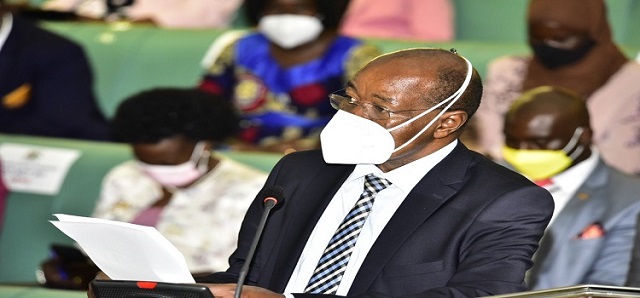
Kampala, Uganda | THE INDEPENDENT | The Minister of State for Planning, Amos Lugoloobi has told MPs that the government has no money to support a special recovery fund for the education sector.
Lugoloobi instead appealed to private institutions of learning to compete for 200 billion Shillings that has been set aside under the Small Businesses Recovery Fund to provide credit to businesses affected by COVID-19.
The Minister was appearing before Parliament’s Education Committee alongside the Deputy Governor Bank of Uganda, Micheal Atingi-Ego and officials from Uganda Development Bank and the Micro-finance support centre, regarding the proposed custom based recovery plan under a motion tabled before parliament to address the economic strain posed by COVID-19 on the education sector.
Private school owners under the National Private Educational Institutions Association-Uganda (NPEIA-UG) had petitioned parliament seeking a recovery fund of 100 million Shillings per school, as a stimulus package to enable a re-start of operations of the sector.
“We are cognizant of the need to maintain the stability of the financial sector by not pressuring supervised financial institutions to give relief to distressed borrowers at the expense of the health of banks. It is also not easy to push for favourable treatment to the education sector and not any other equally distressed businesses,” he said in part.
Education institutions were first closed on March 18, 2020, when President Yoweri Kaguta Museveni announced a national lockdown to curb the spread of the COVID-19 virus. This directly impacted 73,240 government and private pre-primary, primary, secondary, tertiary and higher institutions with a combined population of 15.12 million learners and 548,182 teachers.
These numbers don’t include supporting non-teaching staff, estimated at over 300,000 and businesses that support the supply chain of educational institutions. This closure of close to two years has left several loans acquired by schools and teachers from banks unpaid, with accumulated interest. The pandemic also led to the loss of income for teachers especially those in private schools.
President Museveni recently said that primary and secondary schools would reopen in January 2022 after 4.8 million people in priority and vulnerable groups are fully vaccinated including teachers and 330,000 students aged 18 years and above. The minister acknowledged that there is pressure coming from the demand side of the economy to support different sectors.
“Everybody is demanding resources, but there is also this side that is to deal with the supply to make sure that the resources needed like the proposal of 100 million Shillings per institution which amounts to about 720 billion Shillings…so the supply side is equally challenged and we are very mindful of the problem,” Lugoloobi said.
He added that when the Small Businesses Recovery Fund was discussed a month ago, they recognized that nearly every business was challenged and they did not intend to discriminate against anybody, hence a provision for all Small Businesses and Enterprises (SMEs) to be eligible.
Lugoloobi said that the country’s revenue has been affected due to the pandemic and that it has been cut back by nearly 2.5 trillion Shillings and whatever was budgeted for, cannot be funded, yet the government does not want to borrow more money.
Lugoloobi said that the facility would be overseen by the Bank of Uganda with whom a Memorandum of Understanding is going to be signed.
The minister asked the committee to allow his ministry to go ahead with the 200 billion fund and monitor its performance.
“The most important thing is to begin…get the 200 underway, see how the institutions respond and we shall come to you if need be for a supplementary to see how to strengthen this facility. We really know that the schools and entrepreneurs in this sector have been heavily impaired by the lockdown and the government is very ready to support the sector,” Lugoloobi assured MPs.
Michael Atingi-Ego, the Deputy Governor said that the Bank of Uganda defers to the government on the establishment of a recovery plan, including a revolving recovery fund, which he says implies fiscal provisions together with appropriation by parliament and that the gist of this falls outside the central bank mandate.
He however said that the Central bank stands ready to administer any recovery funds that may be implemented through supervised financial institutions if such resources are availed by the government.
“Indeed, the BoU will administer government’s 200 billion funds for the recovery of small and medium-sized enterprises (SME), as recently announced by the President through a mechanism that is similar to that of the existing Agricultural Credit Facility (ACF),” said Atingi-Ego.
He noted that eligible schools may work with participating financial institutions to access the SME Fund, whose terms would be communicated.
However, the Education Committee Vice Chairperson Cuthbert Abigaba wondered why it was difficult for the government to ring-fence a facility for the education sector like the Agricultural Credit Facility.
Kashari South MP, Nathan Itungo said that the issue of the institutions of learning is very important and shouldn’t be taken lightly. He cited a need for all stakeholders to put heads together and look for a solution to ensure the sector recovers from the Covid-19 stress.
Catherine Mavenjina, the Northern region MP for Older Persons said that the 200 billion is a drop in the ocean and that the education sector should be considered as a priority with a special fund.
*****
URN
 The Independent Uganda: You get the Truth we Pay the Price
The Independent Uganda: You get the Truth we Pay the Price



